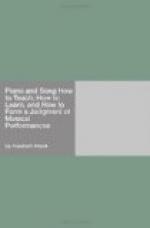DOMINIE. I beg your pardon, madam: you may be right,—from your point of view. We must be a little indulgent with sensitive people. But will not your son play to us?
(Stock plays two
Etudes of Clementi, three of Cramer, and four
from the Gradus, but
did not even grow warm over them. The horse
his father gave him
has made him quite strong.)
* * * * *
I may be asked, “But how did Stock play?” How? I do not wish to write a treatise: my plan is only to give hints and suggestions. I am not writing in the interest of Stock, Buffalo, & Co.
After the playing, we went to supper: the oysters were good, but the wine left a little sharp taste. My timid daughter did not like oysters; but she ate a little salad, and at table listened instead of talking.
A few innocent anecdotes were related at table about horses and balls and dogs and Stock’s future. On taking leave, Madame said condescendingly to Cecilia, “If you keep on, my dear, one of these days you will play very nicely.”
CHAPTER III.
MANY STUDENTS OF THE PIANO AND FEW PLAYERS.
(A Letter addressed to the Father of a Piano Pupil).
It is a pity that you have no sons, for a father takes great delight in his sons; but I agree with you, when you say that, if you had one, you would rather he should break stones than pound the piano. You say you have many friends who rejoice in that paternal felicity, and whose sons, great and small, bright and dull, have been learning the piano for three years or more, and still can do nothing. You are doubtless right; and, further, they never will learn any thing. You ask, Of what use is it to man or boy to be able to stammer through this or that waltz, or polonaise or mazurka, with stiff arms, weak fingers, a stupid face, and lounging figure? What gain is it to art? You say, Is not time worth gold, and yet we are offered lead? And the poor teachers torment themselves and the boys, abuse art and the piano; and at the end of the evening, in despair, torment their own wives, after they have all day long been scolding, cuffing, and lamenting, without success or consolation. You speak the truth. I have had the same experience myself, though not to the same degree, and though I did not bring home to my wife a dreary face, but only a good appetite. But I did not give myself up to lamentation over piano-teaching. I gathered up courage and rose above mere drudgery. I reflected and considered and studied, and tried whether I could not manage better, as I found I could not succeed with the boys; and I have managed better and succeeded better, because I have hit upon a different way, and one more in accordance with nature than that used in the piano schools. I laid down, as the first and most important principle, the necessity for “the formation of a fine touch,” just as singing-teachers rely




